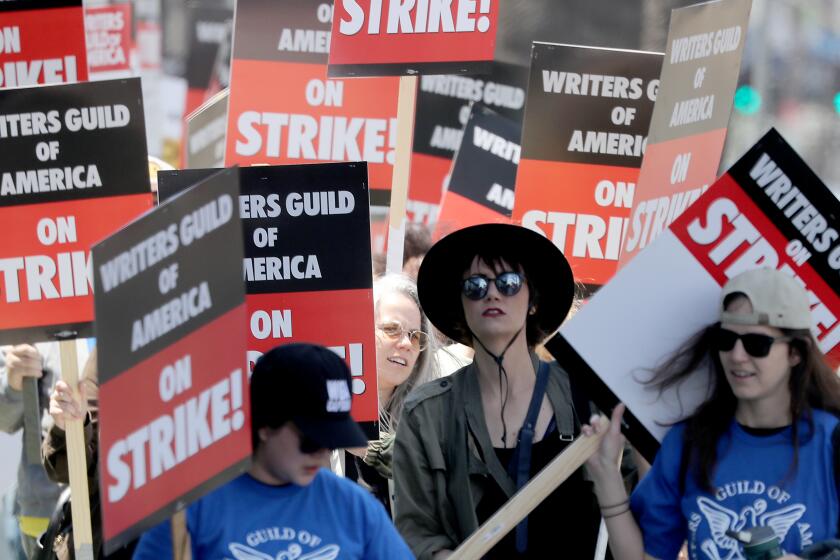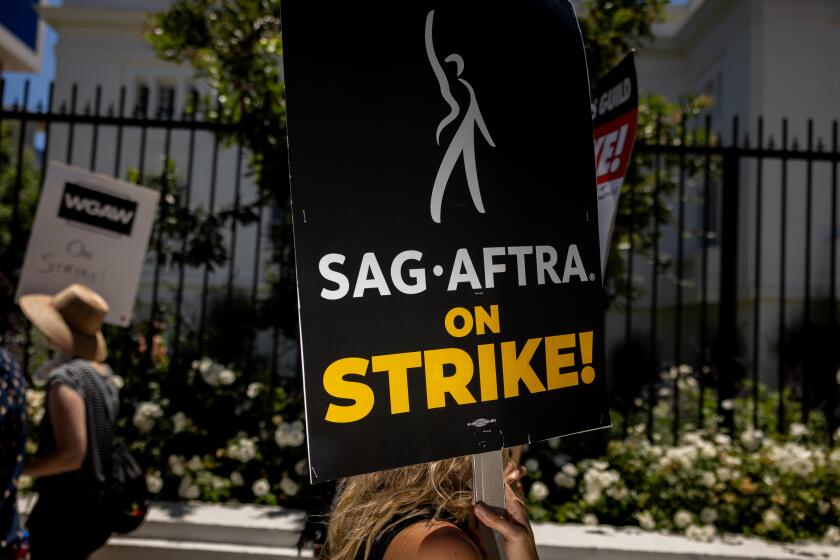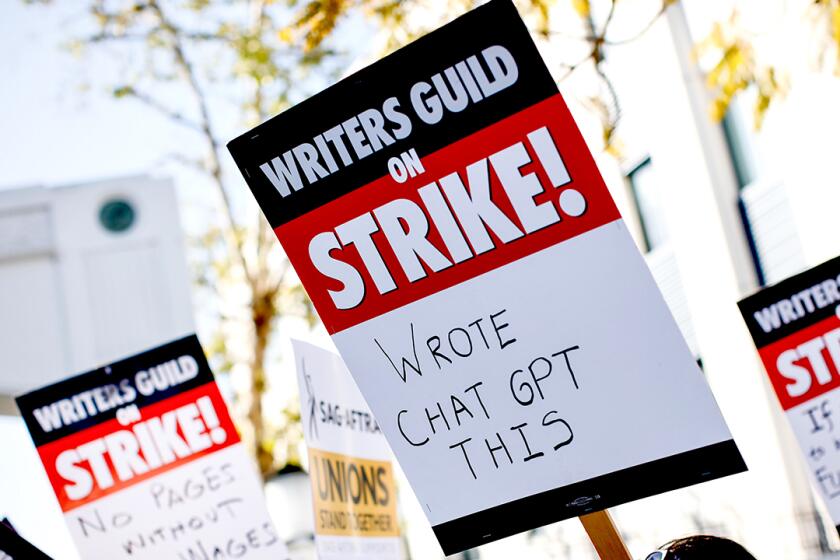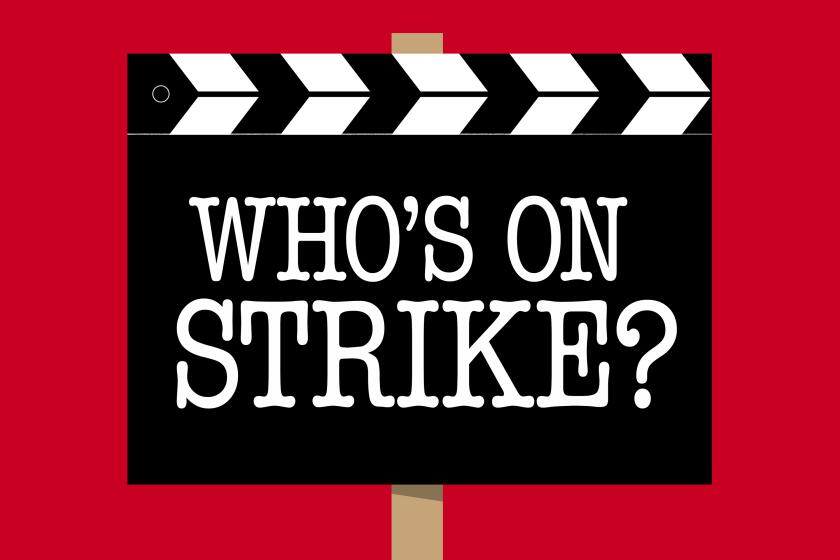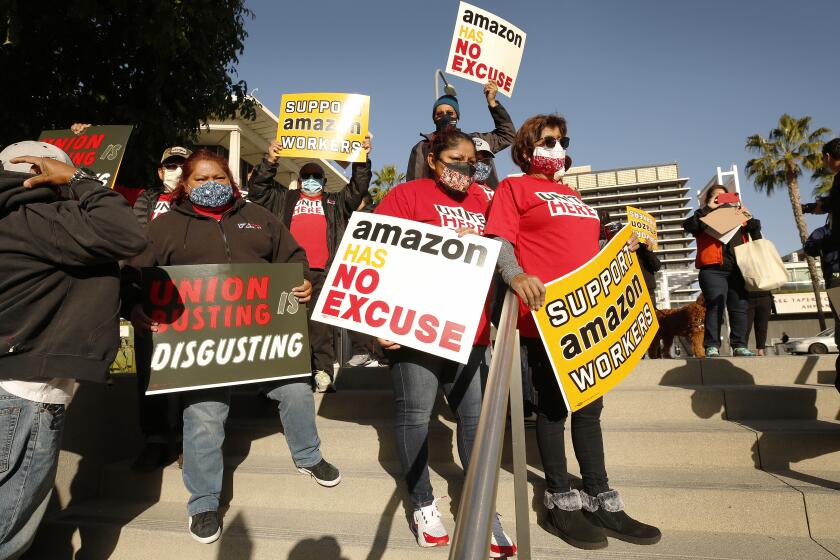Hollywood is on strike because CEOs fell for Silicon Valley’s magical thinking
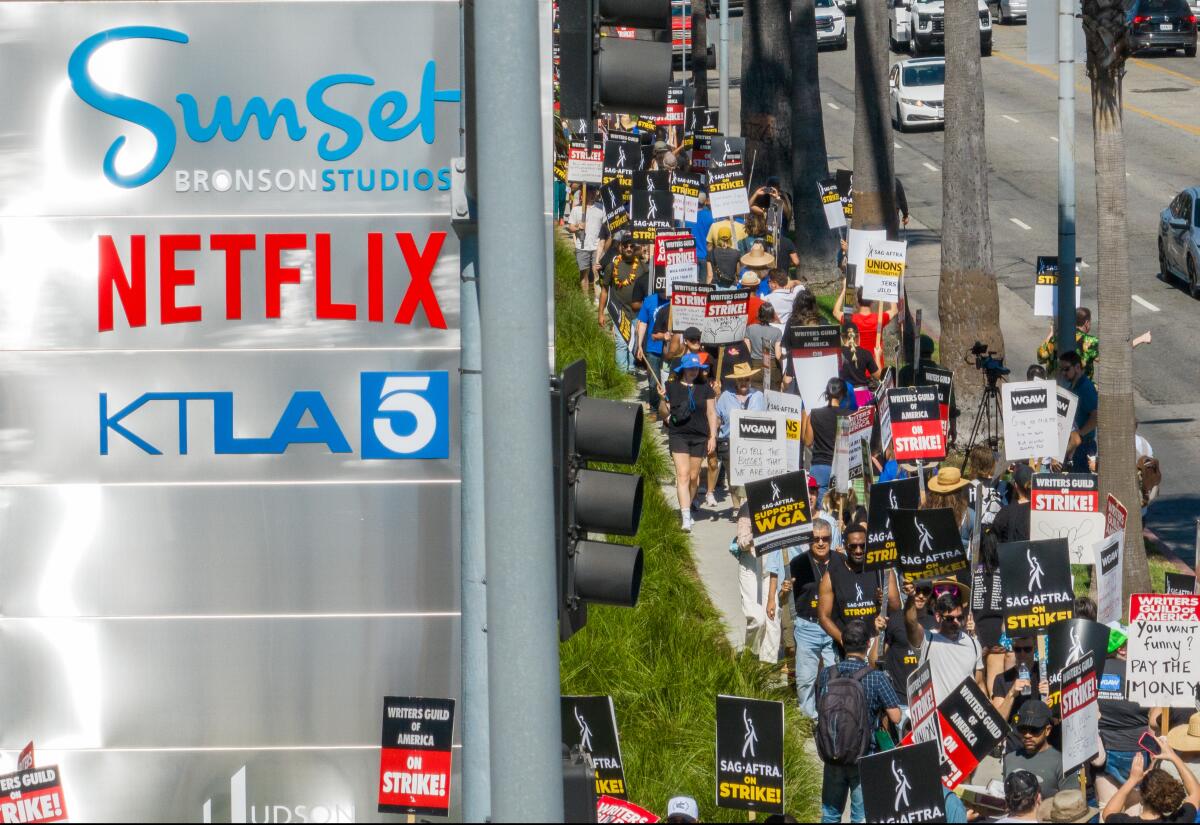
- Share via
In one respect, the actors and writers of Hollywood uniting on the picket lines in a historic, industry-shaking strike is a tale as old as time: one of workers fighting bosses for better pay. Yet the reason this battle is shaping up to be so uniquely intractable and momentous — as you might have gathered from all the headlines about artificial intelligence and streaming economics — is very much of our moment.
But it’s not, ultimately, technology that’s at the root of the problem. It’s that the studio executives both new and old have embraced the powerful — and ultimately disastrous — magical thinking pumped out by Silicon Valley for the last 10 years.
Studio heads are touting the disruptive properties of digital streaming, the transformative power of AI, a brave, unpredictable new world for entertainment writ large — and how writers and actors must adapt to this new future. But just as it did when it was issuing from the tech sector during the 2010s, this talk too often amounts to a smokescreen that lets executives and investors line their pockets and risks leaving workers holding the bag.
The 2023 writers’ strike is over after the Writers Guild of America and the Alliance of Motion Picture and Television Producers reached a deal.
“These companies blew up a successful business model that the public enjoyed, that was immensely profitable, and they replaced it with a mishmash that we have now,” Adam Conover, the star of “Adam Ruins Everything” and a negotiating committee member of the Writers Guild of America, tells me. “And now, they’re refusing to update the contract to reflect those changes.”
We’ve heard a lot about the ways that studios want to reserve the right to use AI — to create endlessly usable digital replicas of actors, to generate scripts that writers will be paid lower rates to fix up. We’ve also heard about the new economic picture ushered in by streaming, about an industry in the throes of change, and the necessity of belt-tightening as a result.
We’ve heard Disney Chief Executive Bob Iger saying the demand by the Screen Actors Guild for fair payment in the new digital landscape “isn’t realistic,” and heard how Netflix saw declining user sign-ups and stock prices last year. Yet Iger reportedly makes $27 million a year, while Netflix just raked in $1.5 billion in net profit in the last quarter.
So what’s really going on? And how did we get here?
First, we need to understand why the 2010s may well come to be remembered as the great decade of magical thinking for Silicon Valley. Drunk on a truly transformational first decade of the 21st century — one that saw Google, Amazon, the iPhone and social media storm the world stage — flush tech investors turned their sights toward the next generation of startups, eager to see them do the same.
The formula for seeking out that next multibillion-dollar “unicorn,” in hindsight, was pretty simple: The next wave of startups had to promise that it would disrupt a stale industry with a newer, high-tech, app-driven alternative, promise the potential for vast scale and promise that it could do so fast. So we saw the rise of Uber and Lyft, each of which vowed to revolutionize transit, and we got the likes of WeWork, which set out to usher in the future of co-working, and Theranos, which would do the same for at-home blood testing.
SAG-AFTRA has approved a deal from the studios to end its historic strike. The actors were on strike for more than 100 days.
We know how it ended. Uber and Lyft have never been sustainably profitable, WeWork collapsed dramatically when it became clear that it was merely a wildly over-leveraged real estate company, and Theranos’ futuristic medical technology was outright fraudulent.
Unlike many of the 21st century’s first-wave tech companies and products, which found both markets and roads to profitability, these were pipe dreams, propped up by a fire hose of investment cash, big-talking founders and the very real — and at the time, quite understandable! — sense that Silicon Valley was the place that determined how the future was made.
As the 2010s began, Netflix sat somewhere between the old guard and the new. It introduced online streaming in 2007, and had a real product with real demand, as well as an established business in its DVD-by-mail rental service. Yet its ambitions were hypercharged by a newfangled sense that it could disrupt the old school Hollywood industry and scale endlessly — there was no reason everyone in the world with access to a screen couldn’t subscribe.
Big-name investors sank hundreds of millions into Netflix’s new vision. As it began producing original content in 2013, it applied a distinctly next-wave Silicon Valley ethos. It would make massive upfront investments, bankrolling huge productions such as the David Fincher-helmed, Kevin Spacey-starring “House of Cards,” elbowing its way into the prestige TV pack, promising not only to compete but also to do it better: It would offer all the episodes at once, on demand, and viewers could consume them whenever and however they wanted. Cable would become obsolete. The future was cutting the cord.
As with Uber and Lyft, whose bottomless chests of venture capital allowed them to conquer new markets once dominated by stodgy old competitors — in their case, the taxi cartels and livery cab companies — price was no object.
Artists, journalists and screenwriters are leading the fight against employers who would seek to replace them with the products of ChatGPT and other generative AI software.
Right out the gate, episodes for original Netflix shows such as “House of Cards” and “Orange Is the New Black” cost $4 million a pop. (So did episodes of shows that few remember today, such as “Hemlock Grove.”) The spending was profligate — it soon rose to rates of $15 billion a year on new content — but as it did for the magical valley startups, the strategy “worked.”
“What happens is Netflix becomes the Wall Street darling, and all these other companies,” like Amazon, Disney, Apple, HBO, Paramount and NBC, “race to adopt Netflix’s business model,” Conover says.
Herein lies the trouble. Amid this boom, which for a few years ushered in a gold rush for writers and talent, Netflix et al. adopted another key ingredient of Silicon Valley’s approach: secrecy. Data about shows’ performance and viewer habits were kept proprietary; we knew only what the streamers wanted us to know. That went for customers, performers, writers and for investors. Streaming is an inscrutable black box, about which so many stories might be told.
It’s a sticking point in the negotiations — actors and writers on streaming series want a better way to calculate the value of their work, given that the residuals they earn are so much lower than for network or cable shows. The studios have resisted. “The reason nobody really wants to open the books on this is because if Wall Street got a look,” one Hollywood insider told New York Magazine, “they’d have a collective stroke.”
What we’re seeing now is the fantastical thinking that Netflix and its followers could continue endless expansion running up against the physics of the real world — there are now 238 million Netflix subscribers, but those numbers dropped for the first time last year, and the company had to claw them back by nibbling at the corners, cutting off password sharing and launching new, cheaper tiers that run ads.
Here’s a breakdown of who is and isn’t walking the picket line.
The boom times are over. Executives know it. Wall Street knows it. And the story that we’re in a revolutionary moment of technological transformation will run out of gas soon. So the bosses are using that moment to do what Silicon Valley wound up doing when its other big swings didn’t pan out: squeeze labor.
Just as Uber and Lyft, which promised drivers rich rewards and flexible fares, started reducing rates and making it harder to earn those rewards, Netflix and the streaming cohort cut in its mold are now trying to square their promises of world conquest by slashing worker pay under the fog of magical thinking.
It’s been noted, and correctly so, that entertainment industry labor disputes often erupt when there’s a change in technology — from theaters screening projected films to the cathode ray tube of the home television, say, or the rise of YouTube and other online content in the 2000s — and that happens for a reason. Historically, executives and management use a disorienting new technology to try to justify lowering wages of their workers, and they have done so since the days of the Industrial Revolution.
“The old CEOs knew they had to work with the unions, bargain with us,” Conover says. “The new ones don’t. So part of the point of the strike is us as labor showing the tech CEOs that no, you actually do have to deal fairly with the unions.”
Conover notes that it’s jarring to see the streamers plead poverty as an excuse not to negotiate with talent in good faith, given that show budgets and profits have both gone up.
“Netflix lied to the public and Wall Street,” he says, telling them, “‘you can watch every show ever made in perpetuity, with no ads, for $15.99 a month forever.’ That’s like Movie Pass” (the much-hyped app that allowed users to see unlimited movies for a monthly fee, before quickly going bankrupt). “That’s ludicrous.”
Ludicrous if you want to pay the people who actually create those shows for you, anyway.
What Netflix and the streamers are trying to do now is seal in a new standard under which writers and actors are treated in much the way that Uber and the gig app companies treat their independent contractor drivers.
“Uber is a perfect example,” Conover says. “Its drivers need to supply their own cars, their own gas, their own insurance and so on.” The drivers are on their own, with few to no benefits or protections, and are expected to maximize profits for the company. “And Netflix is trying to do the same thing.”
Wildly profitable tech companies are citing an as-yet notional recession to make deep workforce cuts. They may have another agenda.
Unlike Uber, Netflix really is quite profitable. But in order to sustain the mythical levels of growth it has promised investors, it is turning to similar tactics — cutting workers’ hours, making work more precarious and unpredictable and reducing pay. It’s a far cry from the sleek, automated futures promised by the studio executives.
As with the biggest companies of Silicon Valley’s magical thinking era, it’s often hard to parse whether the ones touting the game-changing technologies themselves even believe in these visions — do studio execs really think consumers want to watch a parade of digital replicas of their favorite actors parroting lines from an AI-generated script? Or are they simply aware that the mere threat of such a future gives them leverage and power over the workers of today?
In the end, the answer is immaterial. Silicon Valley’s invasion of Hollywood brought with it science fictional notions of growth for the industry, a penchant for secrecy and unaccountability and the expectation that it could get away with treating workers like robots or invisible code. We’re seeing what happens when those notions meet, for one of the first times, with a powerful, organized resistance.
Personally, I’m hoping this one gets a Hollywood ending — and not the ending so many Silicon Valley startups got over the last 10 years.
- Share via
Watch L.A. Times Today at 7 p.m. on Spectrum News 1 on Channel 1 or live stream on the Spectrum News App. Palos Verdes Peninsula and Orange County viewers can watch on Cox Systems on channel 99.
